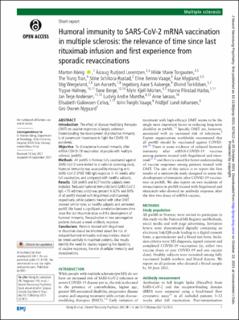| dc.contributor.author | König, Marton | |
| dc.contributor.author | Lorentzen, Åslaug Rudjord | |
| dc.contributor.author | Torgauten, Hilde Marie | |
| dc.contributor.author | Tran, The Trung | |
| dc.contributor.author | Schikora-Rustad, Stine | |
| dc.contributor.author | Vaage, Eline Benno | |
| dc.contributor.author | Mygland, Åse Daasvand | |
| dc.contributor.author | Wergeland, Stig | |
| dc.contributor.author | Aarseth, Jan Harald | |
| dc.contributor.author | Aaberge, Ingeborg Sundsvalen | |
| dc.contributor.author | Torkildsen, Øivind | |
| dc.contributor.author | Holmøy, Trygve | |
| dc.contributor.author | Berge, Tone | |
| dc.contributor.author | Myhr, Kjell-Morten | |
| dc.contributor.author | Harbo, Hanne-Cathrin Flinstad | |
| dc.contributor.author | Andersen, Jan Terje | |
| dc.contributor.author | Munthe, Ludvig Andre | |
| dc.contributor.author | Søraas, Arne Vasli | |
| dc.contributor.author | Celius, Elisabeth Gulowsen | |
| dc.contributor.author | Vaage, John T. | |
| dc.contributor.author | Lund-Johansen, Fridtjof | |
| dc.contributor.author | Nygaard, Gro Owren | |
| dc.date.accessioned | 2022-01-27T13:26:10Z | |
| dc.date.available | 2022-01-27T13:26:10Z | |
| dc.date.created | 2021-12-13T13:05:46Z | |
| dc.date.issued | 2021 | |
| dc.identifier.issn | 0022-3050 | |
| dc.identifier.uri | https://hdl.handle.net/11250/2890501 | |
| dc.description.abstract | Introduction The effect of disease-modifying therapies (DMT) on vaccine responses is largely unknown. Understanding the development of protective immunity is of paramount importance to fight the COVID-19 pandemic.
Objective To characterise humoral immunity after mRNA-COVID-19 vaccination of people with multiple sclerosis (pwMS).
Methods All pwMS in Norway fully vaccinated against SARS-CoV-2 were invited to a national screening study. Humoral immunity was assessed by measuring anti-SARS-CoV-2 SPIKE RBD IgG response 3–12 weeks after full vaccination, and compared with healthy subjects.
Results 528 pwMS and 627 healthy subjects were included. Reduced humoral immunity (anti-SARS-CoV-2 IgG <70 arbitrary units) was present in 82% and 80% of all pwMS treated with fingolimod and rituximab, respectively, while patients treated with other DMT showed similar rates as healthy subjects and untreated pwMS. We found a significant correlation between time since the last rituximab dose and the development of humoral immunity. Revaccination in two seronegative patients induced a weak antibody response.
Conclusions Patients treated with fingolimod or rituximab should be informed about the risk of reduced humoral immunity and vaccinations should be timed carefully in rituximab patients. Our results identify the need for studies regarding the durability of vaccine responses, the role of cellular immunity and revaccinations.
This article is made freely available for use in accordance with BMJ’s website terms and conditions for the duration of the covid-19 pandemic or until otherwise determined by BMJ. You may use, download and print the article for any lawful, non-commercial purpose (including text and data mining) provided that all copyright notices and trade marks are retained. | en_US |
| dc.language.iso | eng | en_US |
| dc.publisher | BMJ | en_US |
| dc.rights | Navngivelse-Ikkekommersiell 4.0 Internasjonal | * |
| dc.rights.uri | http://creativecommons.org/licenses/by-nc/4.0/deed.no | * |
| dc.title | Humoral immunity to SARS-CoV-2 mRNA vaccination in multiple sclerosis: the relevance of time since last rituximab infusion and first experience from sporadic revaccinations | en_US |
| dc.type | Journal article | en_US |
| dc.type | Peer reviewed | en_US |
| dc.description.version | publishedVersion | en_US |
| dc.rights.holder | Copyright 2021 The Author(s) | en_US |
| cristin.ispublished | true | |
| cristin.fulltext | original | |
| cristin.qualitycode | 2 | |
| dc.identifier.doi | 10.1136/jnnp-2021-327612 | |
| dc.identifier.cristin | 1967772 | |
| dc.source.journal | Journal of Neurology, Neurosurgery and Psychiatry | en_US |
| dc.identifier.citation | Journal of Neurology, Neurosurgery and Psychiatry. 2021 | en_US |

